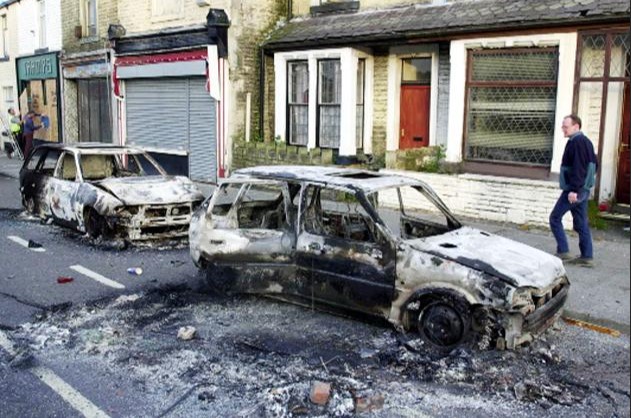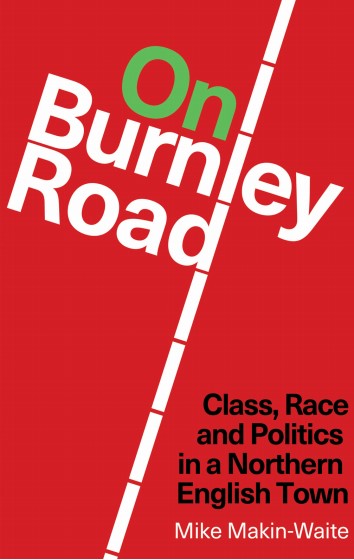Mike Makin-Waite was employed by Burnley Council from 1995 to 2018. Following 2001’s ‘northern town’ riots, he worked on promoting good race relations and community cohesion. As part of this work his team collaborated with the Mediation Northern Ireland (MNI) group; he shares three ‘good relations’ lessons Burnley Council learned. His forthcoming book ‘On Burnley Road: Class, Race and Politics in a Northern English Town’ (published 1 May 2021) includes the chapter ‘From Belfast to Burnley’.
During the early 2000s, Burnley was one of the English ‘northern towns’ to experience serious disturbances, the country’s worst ‘race riots’ for a generation. Problems of racism worsened over subsequent years; in 2003, the far-right British National Party (BNP) briefly became the second biggest grouping at Burnley town hall.
Council officers – including myself – debated how to respond to the rising social polarisation these events exposed. We also needed to address genuine concerns, including over housing. A colleague suggested seeking help from a Northern Irish organisation which had played a part in the peace process there. There were initial concerns – surely we weren’t ‘as bad as Belfast’?

Photo taken in Burnley, 2001
Different contexts, same need for agreement
The hostilities directed by some of Burnley’s white residents towards those of Asian heritage were entirely different from outlooks held by Irish republicans in Andersonstown or British loyalists on the Shankhill Road. Although Stoneyholme and many other neighbourhoods in Burnley had similarly suffered job losses and deprivation over recent decades, the context and degree of conflict, our peoples’ politics and identities were entirely different. What we had in common was that we had to tackle the issues in front of us head on.
We Invited the Mediation Northern Ireland (MNI) team to organise a ‘good relations programme’ in Burnley; they trained local volunteers and council workers in ‘civic mediation’ to explore controversial issues and explore whether residents could agree ways forward.
MNI’s events were often highly charged. Some brought BNP activists face-to-face with representatives of local mosques, creating situations which people found ‘uncomfortable’ but also ‘helpful’. At other times, ‘regeneration’ bosses sat down with residents whose houses were in line for compulsory purchase and demolition. Another session explored complaints by some Asian taxi firm owners that the council was motivated by racism in tightening vehicle safety standards, rules which would cause their businesses extra work and expense.
Here are three lessons we learned.
1. We needed to manage disagreement better
‘Civic mediation’ wasn’t easy: it wouldn’t have been worth doing if it was. But the resulting culture of honest discussion helped residents to manage disagreement better. The BNP would see things differently from the Labour Party. Campaigners against the new homes programme would never be happy with the ‘clearance’ plans. But by getting people to talk together about these things prevented them from retreating to separate spaces which could form a vacuum for resentment of ‘the others’.
2. Reconciliation takes time
Whilst ‘good relations’ promoted some mutual understanding, there was no pretending that reconciliation had been reached when it hadn’t, nor superficial handshakes before groups really ‘had the issues out’.
When Richard from Colne Road explained why white residents felt anxious about the behaviour of Asian youths, and Amjad from Stoneyholme detailed the lifetime of discrimination he and friends experiend in education and when seeking employment, the resulting debates were not easy. But they confirmed the value of hearing different voices and encouraging a process as opposed to expecting residents to agree and move within a certain timeframe.
3. We can address controversial questions with confidence
Burnley’s ‘good relations programme’ unfortunately petered out after 2010. ‘Austerity’ cuts took away the funding, and numerous volunteers moved from town for personal reasons. Nevertheless, the legacy of this work continues.
Local people still have many disagreements on such issues as Brexit, and long-term challenges resulting from deindustrialisation remain. But politicians and professionals are far more confident in addressing controversial questions than they were twenty years ago. Some of those trained by MNI continue to work directly on conflict resolution, including with the Tim Parry Johnathan Ball Peace Foundation, the charity founded by the families of the two boys killed in the 1993 IRA bombing of Warrington.
Find out more about Mike’s book:

